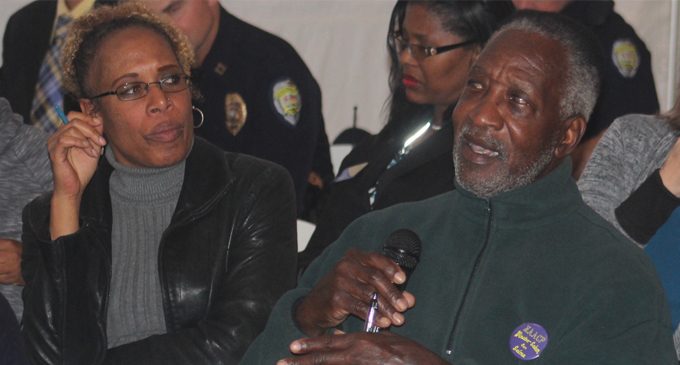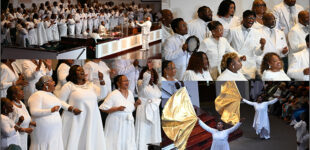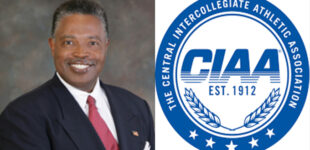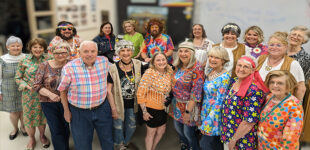Final Urban League town hall tackles implicit bias
Local NAACP President Isaac Howard raises a question about police training during the Black & Blue Town Hall last week.

Photo by Tevin Stinson
BY TEVIN STINSON
THE CHRONICLE
When discussing the relationship between law enforcement and the African-American community, and the root causes to why blacks are more likely to die in custody than whites, it is nearly impossible not to consider the effect implicit bias has on the decisions officers make on a daily basis.
That was the message Dr. Jennifer Eberhardt, a Stanford University social psychologist and associate professor, delivered during the last of three Black & Blue Town Hall meetings hosted by the Winston-Salem Urban League (WSUL).
Also known as implicit social cognition, implicit bias refers to the attitudes that affect our understanding and decision making in an unconscious manner. Eberhardt, who is widely known for her studies on race and inequality, said making judgments based solely on a person’s race, ethnicity, gender, or even someone’s appearance can lead to negative situations. She noted these biases are etched into our DNA and develop as we get older and they are often activated without individuals knowing it.
“Race can influence us more often than we think. In cognitive psychology, we call it un-intentional blindness,” she said. “The idea is that our minds are not designed to pay attention to every single object that is in the world, no matter how distinctive that object might be.”
“Objects become visible and invisible to us based on our goals, expectations, and based on what we already know to be true about the world.”
For nearly two hours, Eberhardt used results from a number of studies and polls that examine the association between bias mindsets and the criminalization of black bodies. In one study, participants were put in front of a computer and shown images of different people, some holding guns and others holding harmless objects. Next, participants were asked to press a button labeled “shoot” when they saw a person with a gun, and “don’t shoot” for those with the harmless item.
When looking at response times, individuals were faster to respond “shoot” to a black person with a gun, than they were to a white person with a gun. According to Eberhardt, race had an effect in the error rates as well. Results from the “Shoot/Don’t Shoot” study proved participants were more likely to respond “shoot” to a black person who did not have a gun, than they were to respond “shoot” to a white person who did not have a gun.
“This study has been replicated by teams of researchers in different regions of the country and you get the same pattern of results,” she said.
A national poll conducted in 2013 indicated that whites are more likely to agree that racial discrimination against blacks is a thing of the past when it comes to terms of interaction with the police, in the court system, and at the voting polls. Eberhardt mentioned one contributing factor to implicit bias is that the always angry, violent, criminal black person has become the poster child for what all African-Americans are like. She said the disproportionate number of blacks that make up the prison population is a contributing factor as well.
“We’re exposed to this black criminalization everyday through a number of channels,” she continued. “In a culture that is saturated with images, statistics, and ideas like we’ve seen, the air is thick with this notion that blacks are prone to criminality.”
After her discussion , Eberhardt and Police Chief Barry Rountree answered questions from the community. To wrap up things , James Perry , WSULCEO , thanked the Winston-Salem Police Department for their participation in all three Black & Blue Town Halls and their attempts to improve community relations. He also applauded Eberhardt for asking the tougher questions that put everyday people in the shoes of police officers.
“What I like about the questions she asked here today is that they force people to look at these situations from the perspective of the police officer,” Perry said.
“I think if we want to continue to build the relationship between the police and the community, we have to take into the consideration all perspectives and not just our own.”
Perry mentioned while he was happy with the turnout and community participation during the town halls, he is aware that no concrete solutions were developed. He said the Urban League aims to find the real answers and solutions.
“Unfortunately, but fortunately, this is only the first step,” he said. “But events like this prove that people and the police are willing to do what it takes to build working relationships.”
“Now that we know the lines of communication are open, we can start working on creating permanent solutions.”














